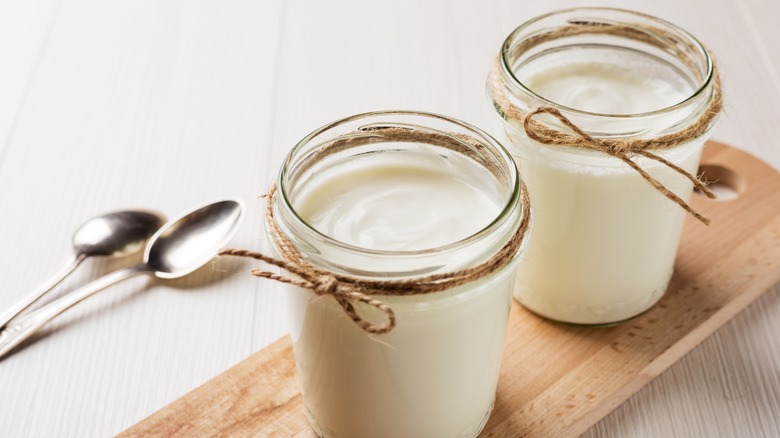Does It Matter What Type Milk You Use For Homemade Yogurt?
Yogurt is both delicious and nutritious. Medical News Today reveals yogurt is jam packed with calcium and protein, which is great for keeping your bones strong and healthy, as well as probiotics to keep your gut free from bloat, constipation, and gas. We love adding this dairy-based ingredient to our morning smoothies and parfaits and using it for yummy marinades and creamy dips and sauces.
If you are wondering if you should make or buy your yogurt, the answer is: Of course! If there was one positive take away from the COVID-19 lockdown, it is that making foods we traditionally run to the grocery store to buy can just as easily be made at home. According to Martha Stewart, this includes yogurt which, at its most basic, only takes two ingredients and 20 minutes of your day.
How do you make homemade yogurt? Per the U.S. Dairy, yogurt is made with milk and some type of active bacterial culture starter that ferments your dairy. From there, the organization notes you can add flavors or whatever sweeteners you like. Sounds easy, right? But once you start going down the rabbit hole of yogurt making, you may find yourself asking, "Does it matter what type of milk you use to make your yogurt?"
It's your choice
When it comes to milk and making yogurt, you've got options. According to Serious Eats, the type of milk you use to make your homemade yogurt is really one of personal preference. If you are a fan of 2%, skim, or whole milk, you are in luck because they all work in making yogurt. Yogurt Nerd also reveals you don't have to just stick to cow's milk. Both sheep and goat's milk can work, too. However, Serious Eats also suggests that your milk choice will affect your yogurt. This is especially true when it comes to the final product's creaminess and taste. For this reason, they tend to opt for whole fat cow's milk.
But the one milk criteria that seems to have people divided when it comes to milk selection and making yogurt at home centers around the extent to which the milk has been pasteurized. Serious Eats recommends not using ultra pasteurized milk, and Yogurt Nerd explains that this is due to the fact can leave your yogurt with a "cooked" flavor. However, according to reader advice at the New York Times, ultra pasteurized milk works just fine and can produce some tasty yogurt.

